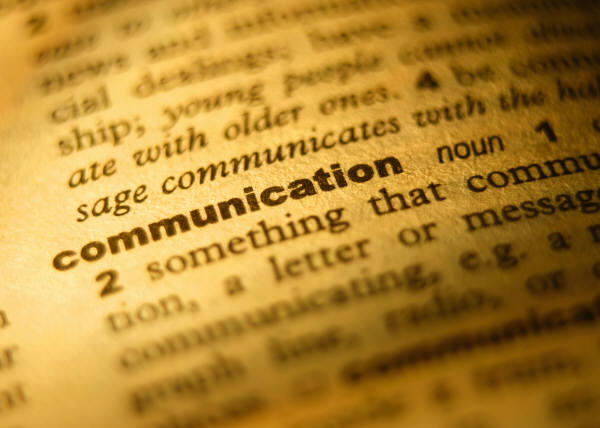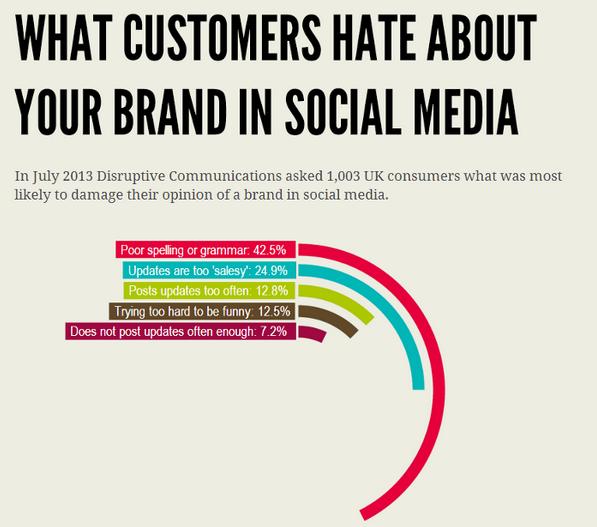19 Dec Grammar and spelling in blogs.
I can already hear the moans and groans … ‘Not another missive about bad English on the web … bla bla bla’. Well, yes it is – and there is good reason for it being here.
You may have read an earlier blog entry about punctuation – or you may have looked at the title and ran straight for the door. Let’s face it, if you really think about it, the way we present our thoughts, market our products, update our status, write a tweet or respond to a forum is there for the whole online world to see. Yes, the whole of it. Your contribution to the online community is important (it must be, otherwise why did you put it there?) so shouldn’t it be correct?
No matter what your thoughts on grammar and spelling in general, if you’re writing a piece for the web, no matter how big or small, then you’re publishing your writing and it becomes a reflection of you and your work; and more importantly, your worth.
The blog has become extremely popular. It began life as a ‘web log’. The piece would be a ‘log’ or record of a string of events, for example, a journey across Europe; each stage being logged chronologically. It then developed and people started to log such topics as their pregnancy; a battle through illness; and various other events that could be regularly updated with the latest information. The word weblog then became shortened over time to word we now know and love.
Today, businesses and individuals alike use the blog for a whole host of reasons. But more importantly, it has also become a tool to be used by those who visit a site as a means of finding out more about that business or person, to learn what they’re about, to assess their credibility and to see what others think.
So why bother?
While the blog might be considered the place where things are a little more relaxed, if it’s full of grammatical and spelling errors, then the reader may just walk away and look somewhere else. After all, if the content there is shoddy, then it probably is elsewhere within the site. This small seed is then sewn and doubt enters the mind. ‘What’s their customer service like? Do they do a good job? What if I have a problem? Hmmm … I’ll look somewhere else.’ It’s a fact that poor spelling and grammar (including punctuation) are indiscretions that are most likely to damage opinion of a brand or person within the social media arena.
Like it or loathe it, that’s how people think … and seriously … is it worth it? If you have put the time and effort in to produce a piece, then it’s there for everyone – including those who really couldn’t be bothered, and of course, those who could. Not convinced? Disruptive Communications asked over one thousand UK consumers about things they really dislike about brands being promoted through social media. Several topics emerged and there, right at the top of the list, is poor spelling or grammar which irked 42.5% of the respondents.
If your work is hard to read because it’s packed with awkward sentences that are poorly punctuated, together with spelling mistakes that are just plain embarrassing, then you can rest assured that readers will not only become irritated but will have a good laugh at your expense (even posting them on other blogs and forums) before visiting a more professional site to find the information or opinion they’re looking for.
We just have to take it on the chin. Accept criticism graciously and learn from it. The writing of this piece will no doubt provoke reaction of all sorts (like being called the grammar granny, the punctuation police and being told to ‘get a life’ … or worse) but in a way, it’s all useful stuff and can be used to quickly sort out those who have something worth saying and those who don’t.
Make your blog stand out
Whether you’re blogging for business or for pleasure, your work needs to stand out … and not for the wrong reasons. I could fill this piece with howlers that have been seen scattered about the web, but you’ve probably already seen them on those jokey emails that come around.
There’s a sense of pride when you’ve finished writing a piece that not only sounds good, but looks good. Don’t be afraid to use the spell checker (with caution, see below) and if you’re not sure you have used the right word, or think you’re repeating the same word frequently, try right-clicking the word then hover over ‘synonyms’. You’ll be presented with some good alternatives (MS WORD only). If you’re a little unsure about aspects of punctuation, invest in a great little aide such as The Penguin Guide to Punctuation (Trask.R.L. (1997)), and together with a decent dictionary by your side you’ll be able to produce cogent pieces which will enhance your credibility, not deplete it.
Using the written word well is hard enough, but preparing your work for a (potential) global audience is even more daunting. When writing a blog, the tools of your trade are your keyboard and the English Language. Using the keyboard is the easy part …
…………………………………………………………………………………
Why do we judge people we don’t know and will probably never meet by the way they write?
Is web content to be viewed any differently than, say, a novel or a serious newspaper article?
Should we forgive spelling and grammar mistakes in blogs?
Use the spell checker – carefully!
Eye have a spelling chequer
It came with my pea sea
It plainly marques four my revue
Miss steaks eye kin knot sea.
Eye strike a key and type a word
And weight four it two say
Weather eye am wrong oar write
It shows me strait a weigh.
As soon as a mist ache is maid
It nose bee fore two long
And eye can put the error rite
Its rare lea ever wrong.
Eye have run this poem threw it
I am shore your pleased two no
Its letter perfect awl the weigh
My chequer tolled me sew.





Sorry, the comment form is closed at this time.